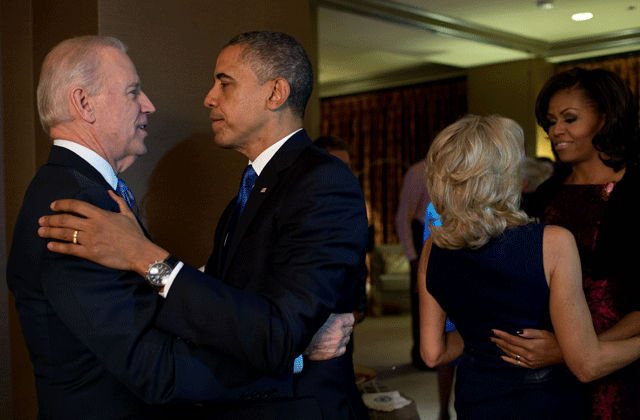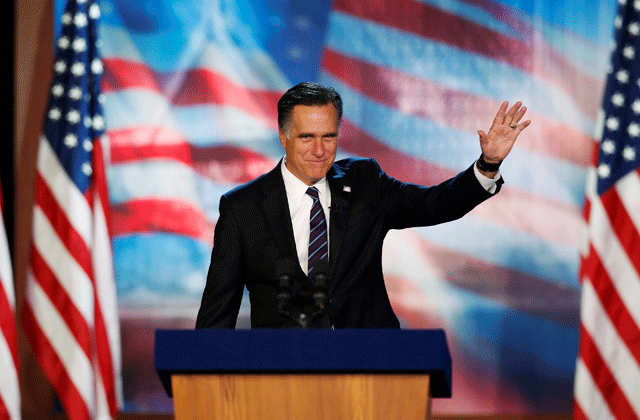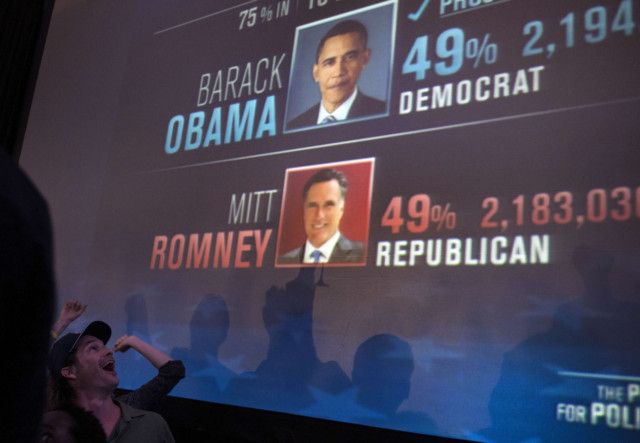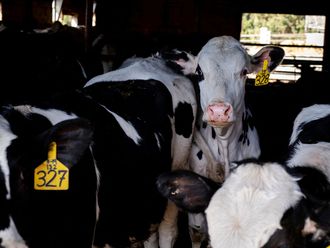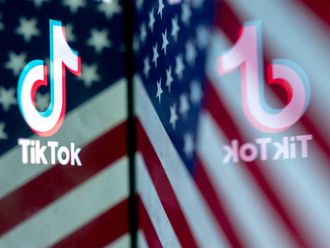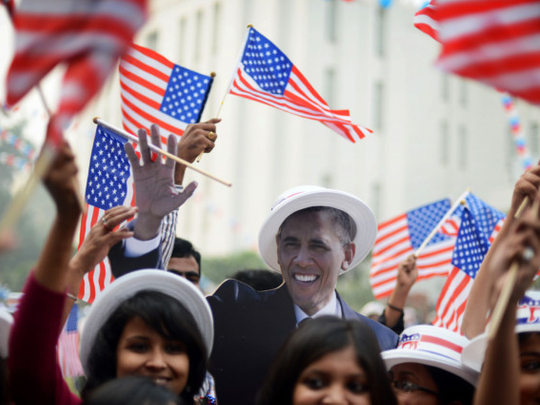
Jakarte, Indonesia: From his old school in Indonesia to a Japanese beach town that happens to share his name, people around the world cheered President Barack Obama’s re-election Wednesday and expressed hope that he will help allay global conflicts and economic woes.
The results of Tuesday’s election were closely watched in many countries. Several US embassies held mock elections and threw parties as returns came in.
At Jakarta’s Menteng 01 Elementary School, which Obama once attended, students happily marched with a poster of the president from one classroom to another after hearing that he had defeated Republican Mitt Romney to win a second term. “Obama wins ... Obama wins again,” they shouted.
A statue of a young “Barry” Obama, as he was called as a child, stands outside the school.
“I want to be like him, the president,” student Alexander Ananta said.
The news also thrilled Obama’s former nanny in Indonesia, Evie, who became well known this year following reports of her struggles living in the conservative country as a transgender.
“Hopefully, he will contribute to the betterment of not only American citizens, but to the world as well,” said Evie, who like many Indonesians uses only one name.
China’s Foreign Ministry said President Hu Jintao and Premier Wen Jiaobao phoned Obama to congratulate him. Vice President Xi Jinping, who is to begin taking over this week in China’s once-a-decade leadership transition, phoned Vice President Joe Biden to congratulate him.
British Prime Minister David Cameron posted his regards on Twitter: “Warm congratulations to my friend (at)BarackObama. Look forward to continuing to work together.”
Though Iranian media have long said the country saw little difference between Obama and Romney on tensions over Tehran’s nuclear program, that did not stop the semiofficial Fars news agency for rolling out the vivid headline, “Republican’s elephant crushed by Democrat’s donkey.”
Israeli Prime Minister Benjamin Netanyahu, who has had a strained relationship with the American president over his policies on Iran and the Israeli-Palestinian conflict, congratulated the president in a text message to reporters. “I will continue to work with President Obama to preserve the strategic interests of Israel’s citizens,” he said.
The Western-backed Palestinian Authority has been disappointed that Obama did not pressure Israel to make greater efforts to make peace with the Palestinians, including a freeze on all settlement construction. In the absence of negotiations, senior Palestinian official Saeb Erekat urged the US president to reverse course and support Palestinian efforts to seek U.N. General Assembly recognition of an independent state of Palestine.
“We have decided to take our cause to the United Nations this month, and we hope that Obama will stand by us,” Erekat told Wafa, the official Palestinian news agency.
In China, Obama’s re-election was good news for people concerned about Romney’s vow to label China a currency manipulator if elected. Some feared that would ignite a trade war between the world’s two biggest economies.
“His re-election is in line with what the Chinese people want,” said Hong Zihan, a graduate student who monitored the results at a US Embassy event in Beijing.
For Obama, Japan, the president’s re-election means more opportunity to capitalize on their shared name. Obama means “little beach” in Japanese.
The western coastal town threw a party as they watched the election returns. Hula dancers known as the Obama Girls swayed in homage of the president’s home state of Hawaii, said Obama city hall official Hirokazu Yomo.
“Four more years,” Yomo said. “So we are happy this will continue and help with building our city.”
In Myanmar, which is pushing political reforms forward after five decades of military rule kept it isolated from much of the rest of the world, some said they were relieved Obama was re-elected because he chosen to engage rather than sanction their country.
“It is good that President Obama is re-elected. President Obama is very flexible and international relations have improved during his term,” said Thit Oo, a 42-year-old car mechanic.
Washington has started focusing more on Asia since Obama took office. Some Asian countries, including the Philippines and Vietnam, have been looking more toward the US as tensions flare with China over disputed territories in the South China Sea.
“In Asia, he needs to fine tune the building of alliances without overtly appearing anti-China,” Ramon Casiple, a political analyst in the Philippines, said of Obama. “At the same time, he needs to encourage countries with border disputes with China that he’s on their side.”
A spokesman for the main Syrian opposition bloc, the Syrian National Council, expressed hope that the election victory would free Obama to do more to support those trying to oust Syrian President Bashar Assad.
“We hope this victory for President Obama will make him free more to make the right decision to help freedom and dignity in Syria and all over the world,” SNC spokesman George Sabra said on the sidelines of an opposition conference on the Qatari capital of Doha.
Sabra renewed the opposition’s appeal to the international community to supply rebel fighters with weapons.
The Obama administration and its Western allies have ruled out military intervention in Syria. The US has also been cool to opposition rebels’ demands for weapons such as anti-aircraft missiles, out of concern that they could fall into the wrong hands. The US and other foreign backers of the Syrian uprising have urged the fractured, largely exile-based opposition to unite and include more representatives from inside Syria.
Obama’s re-election for another term in the White House opens a new chapter in the already historic tale of the first black president of a nation scarred at birth by a deep racial fault line.
But for Obama partisans his re-election was essential. Only with a full eight years at the helm of the US presidency will he be remembered for the change he wrought and not just for the change he represented.
Though it was key to the euphoria that greeted his first election in 2008, Obama’s race has rarely been a dominant political theme since.
Quickly, the same political dynamics faced by many of his predecessors: divided, vicious, partisan politics threatened to swamp the 44th US president.
All presidents crave the validation of a second term but for Obama that desire may have been even more keen, as his Republican foe Mitt Romney had vowed to quickly reverse much of his legacy.
Obama’s whole political project, the idea that America is not as divided as it seems, that a grass roots movement can change a nation from the bottom up, and that hope has tangible political power, was on the line.
“Our destiny is not written for us; it’s written by us,” Obama told a crowd at a recent New Hampshire rally, seeking to revive the sense of possibility that powered his first election win, but has since dissolved.
“We look forward to that distant horizon, to that new frontier. We imagine a better America and then we work hard to make it happen.”
Now, much of Obama’s second term will be devoted to cementing the legacy of his first.
He will enshrine his health care reform - the most sweeping social legislation for 50 years, which Romney promises to end on his first day in the Oval Office - deep into American life.
Obama may get several more chances to reshape the Supreme Court for a generation, after adding two women, including the first Hispanic justice in his first term.
And the president, 51, will solidify his reforms on gay rights, women’s rights, student loans and financial reform and may yet even seek ways to tackle global warming and immigration reform.
Obama, now a graying, sometimes terse and wizened figure is a changed man from the beaming young dreamer who bounced onstage in early 2007, on a bitterly chill day in Illinois, and announced his presidential bid.
“You have seen the scars on me to prove it. You’ve seen the gray hair on my head to show you what it means for fight for change, and you have been there with me,” he told a crowd on Monday in Madison, Wisconsin.
Rocketing from political obscurity, Obama, a senator for only two years, promised to use “the power of hope” to transform a nation - a message he belted out to massive 2008 crowds, often moving his audience to tears.
He invoked a politics where people could “disagree without being disagreeable.”
But the hope and optimism of his win over Republican John McCain barely survived the first contact with polarized Washington politics.
Obama the president emerged as an elusive figure of many contradictions.
A Nobel Peace laureate who got US troops out of Iraq, Obama ruthlessly applied lethal force in a drone war and the mission to kill Osama bin Laden.
Candidate Obama chided political leaders who feuded over “small things” yet lambasted his 2012 foe for a flip flopping condition he calls “Romnesia.”
Obama inspired a generation to get into politics for the first time: but once president, appeared to disdain the grubby business of getting things done in Washington.
He was devoted to the grand gesture on the world stage - for example his speech to the Muslim world in Cairo in 2009 - but despite some success, his presidency hardly transformed America’s place in the world.
And the hope that exploded in 2008 soon fizzled.
Four years on, Obama is locked in a grim grind to the finish with the joy of four years ago but a memory.
Some things have not changed. Obama retains the burning self confidence, - foes call it arrogance - and a fierce will to win.
In its way, victory on Tuesday night could be historic in its own right, as Obama defied a level of economic blight that made other presidents one termers.
Busting convention is written in Obama’s political DNA - not for him a political apprenticeship in the Senate: he left to slay the mighty Hillary Clinton machine in the 2008 Democratic primary.
Matching dazzling oratory with a formidable grass roots network, Obama, along with cerebral aides like David Plouffe, re-invented how US elections are won in 2008.
His massive operation will redefine re-election races if he wins next week.
Obama, despite the claims of conservative conspiracy theorists, was born in Hawaii in 1961 to a black Kenyan father and white mother from Kansas. His father abandoned the family when “Barry” Obama was just two.
His mother Ann, an anthropologist who died in 1995, took her son with his new stepfather to Indonesia and he returned to live with his grandparents in Hawaii in his restless teens.
After attending an elite Hawaii academy and two colleges including Columbia University in New York, Obama went to the elite Harvard Law School and was the first African-American to edit the Harvard Law Review.
Married in 1992 to Michelle, a fellow lawyer, Obama rose through bare-knuckle world of Illinois politics then announced himself to the world at the 2004 Democratic convention.


